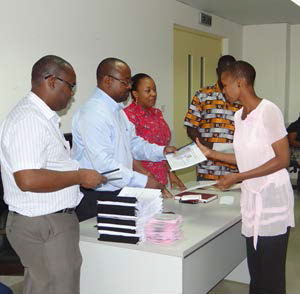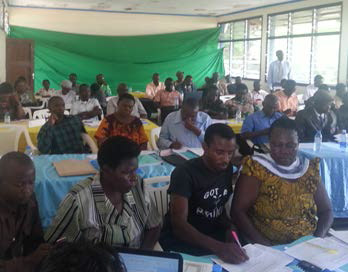A mobile phone-based electronic data reporting platform for IDSR allows the the Ministry of Health and Social Welfare to gather and share data more efficiently, leading to enhanced planning and quicker responses to epidemics.
As part of these efforts, TVCSP led a series of trainings in the use of an innovative electronic Integrated Disease Surveillance and Response (eIDSR) system. The system captures data on epidemic-prone diseases of public health importance, which then are collected and reported by health facilities on a weekly basis through mobile phone technology.
Prior to eIDSR, data on malaria and other epidemic-prone diseases in Tanzania were collected and reported using a paper-based system. However, the paper-based system often resulted in incomplete data, as well as prolonged data reporting processes. These factors contributed to inadequate planning and untimely responses to disease outbreaks.
In response to these challenges, TVCSP and the Ministry of Health and Social Welfare (MoHSW)—in collaboration with the U.S. President’s Emergency Plan for AIDS Relief, U.S. President’s Malaria Initiative, CDC Foundation, and the University of Dar as Salaam—developed a mobile phone-based electronic data reporting platform for IDSR. The new electronic system enables the MoHSW to gather and share data more efficiently, leading to enhanced planning and quicker responses to epidemics.
Health care personnel from 477 regional and district health facilities in Temeke District in Dar es Salaam Region, Misungwi District in Mwanza Region, Bunda District in Mara Region, and all districts in Kagera Region participated in the TVCSP-led trainings. To further build local capacity, TVCSP provided participants with reference materials to use when conducting surveillance and response activities and to disseminate to their colleagues.

Participants of the eIDSR training in Temeke District receive resource materials. Source: RTI International
“We believe these trainings better informed the attendees about the importance of malaria surveillance and response, with the ultimate hope that improved reporting will result in robust health care programs and better policy,” stated TVCSP Senior Epidemiologist Dr. Jeremiah Ngondi.
As a result of these trainings, health care personnel enhanced their understanding of electronic data transfer mechanisms and learned how to carry out electronic data transfers through mobile phones. Attendees also reported having deeper knowledge of best practices in malaria surveillance and epidemic responses.
When providing feedback at the conclusion of the training, participants noted that the training generated “new ideas on how to report data.” They also noted that eIDSR will “simplify [their] work” and that the system is “very friendly [to use] for getting data from health facilities.”
The Tanzania Vector Control Scale-up Project is funded with the generous support of the American people through the U.S. Agency for International Development under the U.S. President’s Malaria Initiative.

